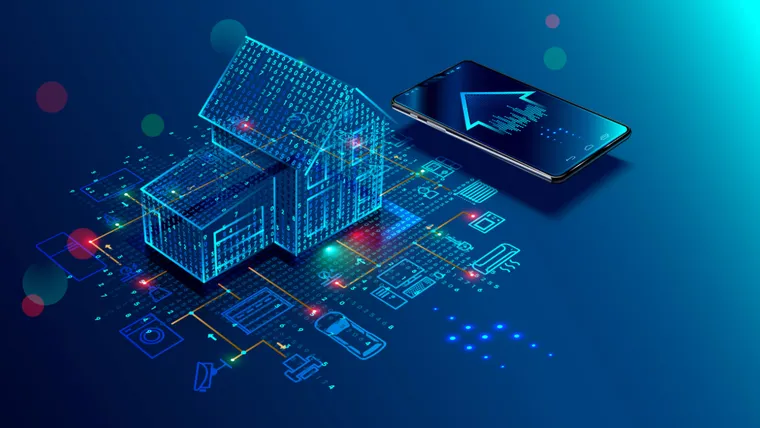Smart home technology is changing the way we live by blending convenience, energy savings, and comfort into one seamless experience. At the heart of this innovation are energy-efficient devices such as smart thermostats, LED lighting systems, and automated controls.
These devices make life easier and are designed to adapt to your lifestyle while also reducing your carbon footprint. For real estate professionals and homeowners alike, embracing this technology can transform everyday living and add significant value to properties.
What Is Smart Home Technology?
What makes these devices truly “smart” is their ability to learn your habits using artificial intelligence and machine learning. They optimize their operation for maximum efficiency, making life more convenient while saving energy. Imagine a system that adjusts your lighting or heating without you even lifting a finger—it’s that level of ease that makes smart technology so appealing.
Convenience is key here. These systems adapt to your routines, whether it’s dimming the lights for movie night or adjusting the temperature while you’re away. With remote control options, you can manage your home from anywhere using your smartphone or voice commands. And because smart devices track energy usage, they give you actionable insights to make your home even more efficient.
For real estate professionals looking to stay ahead, incorporating smart home technology knowledge into your practice can even enhance your expertise, and these topics can be covered by taking the right real estate continuing education/license renewal course.
Smart Thermostats: Efficient Climate Control
If you’re looking for an easy entry point into smart home technology, smart thermostats are a great place to start. These Wi-Fi-enabled devices automatically adjust heating and cooling to maintain comfort while helping you save energy.
Many models are ENERGY STAR® certified, which means they meet strict energy efficiency standards. Think about it: your thermostat learns your habits, creates schedules, and even knows when you’re coming home.
Some models use geofencing technology to adjust the temperature based on your location. Plus, with smartphone apps, you can control your home’s climate from anywhere, whether you’re at the office or on vacation.

The benefits don’t stop there. Smart thermostats can help you save up to 10% annually on your heating and cooling bills. They can also come with features like low-power standby modes and automatic updates.
As an added bonus, many utility companies offer rebates or incentives for installing these devices, making them a smart financial investment as well.
Energy-Efficient LED Lighting Systems
When it comes to lighting, LED technology has taken energy efficiency to the next level. LED lighting can conserve energy and create the perfect ambiance for your home. From smart bulbs to recessed fixtures, LED systems offer unmatched versatility, longevity, and comfort.
These lights last significantly longer than traditional bulbs—up to 50,000 hours—and use up to 80% less energy. That’s not just good for your wallet; it’s great for the environment.
LED lighting also supports human-centric living. You can adjust the color temperature to match your mood or activity, whether you’re winding down for the evening or focusing on a work project.

Modern smart lighting systems take it a step further with features like automation, app integration, and sensors that adjust brightness based on room occupancy or natural light levels. It’s lighting that works with you, not against you.
If you're a real estate professional taking a real estate CE class or exploring a new real estate course, understanding energy-efficient innovations can add value to your transactions and client relationships.
Integrated Systems: Where It All Comes Together
Here’s where it all comes together. A truly smart home thrives on integration, with devices like thermostats and lighting systems working together seamlessly through a central hub.
Whether it’s Amazon Alexa, Google Home, or another platform, these hubs let you control everything with simple voice commands or automated schedules. Imagine walking into your home as the lights brighten, and the temperature adjusts to your comfort level—all without lifting a finger.
Choosing the Right Smart Home Technology
When selecting smart devices for your home, it’s important to think about compatibility, energy efficiency, and ease of use. Make sure the devices integrate with your existing systems and prioritize features that are intuitive and future-proof. After all, you want your smart home to grow with you and keep pace with evolving technology.
Smart home technology is more than just a trend—it’s a game-changer for the way we live. If you’re a real estate professional looking to add value to a property or a homeowner seeking convenience and savings, these innovations offer something for everyone. So why not explore the possibilities and take the first step toward a smarter, more energy-efficient home?
To Learn More...
For real estate professionals, understanding these concepts can be particularly valuable during discussions with clients about energy efficiency and property improvements.
If you’re preparing for your Real Estate Continuing Education or looking to enhance your knowledge through a Real Estate Course, topics like insulation and energy efficiency can help set you apart.

As part of your License Renewal Course or other Real Estate CE efforts, staying informed on foundational property concepts like insulation can make a big difference in your expertise and client relationships.

